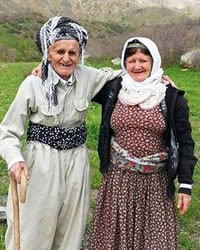Gurani, Hawrami in Iran

Photo Source:
Nodshah - Wikimedia
Creative Commons
|
Send Joshua Project a map of this people group.
|
| People Name: | Gurani, Hawrami |
| Country: | Iran |
| 10/40 Window: | Yes |
| Population: | 233,000 |
| World Population: | 334,000 |
| Primary Language: | Gurani |
| Primary Religion: | Islam |
| Christian Adherents: | 0.00 % |
| Evangelicals: | 0.00 % |
| Scripture: | Portions |
| Ministry Resources: | No |
| Jesus Film: | Yes |
| Audio Recordings: | Yes |
| People Cluster: | Kurd |
| Affinity Bloc: | Persian-Median |
| Progress Level: |
|
Introduction / History
The Gurani are an Iranian ethnic group that consists of several sub-groups, including the Bajelani and the Hawrami. They live in the northern regions of Iran and Iraq in an area commonly known as Kurdistan, or land of the Kurds. For this reason, they are often categorized as Kurds.
What Are Their Lives Like?
They farm and raise livestock as their chief occupations. They mainly grow wheat, barley, rye and oats. Additionally, they grow cotton, olives, rice, sugar beets and tobacco. During the summer months, the Gurani, like many other Kurds, take their sheep, goats, donkeys and mules to higher mountain pastures; winter grazing occurs in the lower plains.
What Are Their Beliefs?
Almost all Hawrami Guranis are Muslims.
What Are Their Needs?
Iranian Christ followers are almost all in urban centers and they speak Farsi, not Gurani. Who will go to them?
Prayer Points
Pray the hearts of the Hawrami Gurani would be stirred to hunger after God and to drink of living water.
Pray for family-based movements to Christ to transform Hawrami Gurani society, blessing them spiritually and economically.
Pray for the Lord to move in the hearts of believers to give up their rights and sacrifice their lives to see the Hawrami Gurani blessed by the work of Jesus Christ.